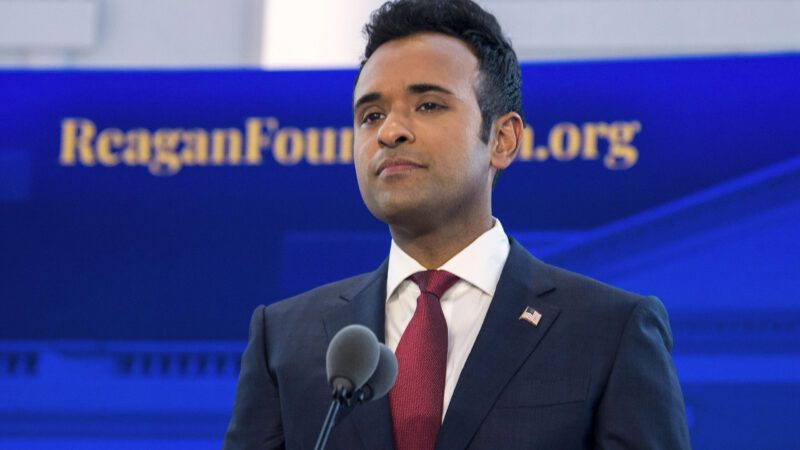Vivek Ramaswamy Proposes a (Probably) Illegal Plan To End Birthright Citizenship
It’s highly unlikely that it would pass constitutional muster.

During Wednesday night's Republican presidential debate, candidates re-upped their calls to close and militarize the U.S.-Mexico border, "defund sanctuary cities," and deport undocumented immigrants. They overwhelmingly pushed for harsh and ineffective policies—but one candidate pushed a plan that isn't just bad but very likely illegal.
"I favor ending birthright citizenship for the kids of illegal immigrants in this country," said Ramaswamy. "Nobody believes that the kid of a Mexican diplomat in this country enjoys birthright citizenship…neither does the kid of an illegal migrant who broke the law to come here."
Ramaswamy is wrong on the latter point. The 14th Amendment "gives birthright citizenship to children of undocumented immigrants and visa holders" if they're born on U.S. soil, wrote Ilya Somin, a law professor at George Mason University, in 2018. "Even if that were not the case, the power to grant citizenship is a congressional power, not an executive one."
Somin isn't alone: As he said, there is an "expert near-consensus on this subject," which "is backed by longstanding Supreme Court precedent, going back to United States v. Wong Kim Ark (1898)." The case affirmed that all people born on U.S. soil—with the exception, Somin wrote, of kids born to "foreign diplomats, soldiers of invading armies, and (at the time) certain members of Indian tribes"—were afforded citizenship by the 14th Amendment. What's more, the Constitution grants Congress, not the president, the authority to "establish an uniform Rule of Naturalization."
When former President Donald Trump proposed ending birthright citizenship "with an executive order" in 2018, Damon Root responded that Trump's plan "would be flatly unconstitutional." And going beyond procedure, "the U.S.-born children of both legal and illegal immigrants clearly qualify for birthright citizenship under the 14th Amendment."
Though Ramaswamy goes particularly far, saying that he'd deport the U.S.-born children of undocumented immigrants, other Republican presidential candidates share his general view on birthright citizenship. Florida Gov. Ron DeSantis has said that he wants to "end the idea that children of illegal aliens are entitled to birthright citizenship if they are born in the United States." Likewise, a spokesperson for former South Carolina Gov. Nikki Haley told the Daily Caller in June that she "opposes birthright citizenship for those who enter the country illegally."
The Republican candidates have reignited a debate over birthright citizenship that Trump brought into the spotlight during his first term. As with many aspects of the modern GOP's immigration debate, candidates are embracing formerly fringe Trump-era ideas in an attempt to look tough.
Ramaswamy didn't specify the exact mechanism he'd use to end birthright citizenship. But the president simply doesn't have the authority to redefine who the 14th Amendment applies to, and his reading of the Constitution flies in the face of a 125-year-old precedent.


Show Comments (52)